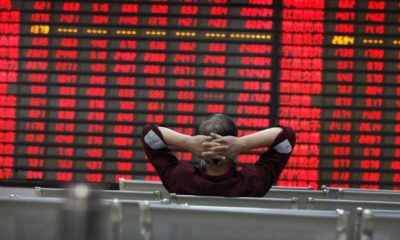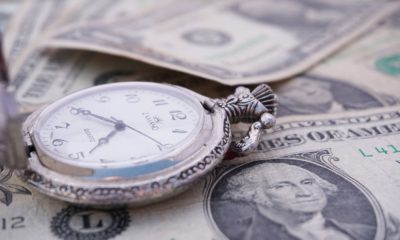bank
This Market Genius Believes A Crash Is Coming

Interview's overview
If you managed to catch The Big Short, the standout character will no doubt be Michael Burry, portrayed by Christian Bale.
Neurotic, eccentric, and constantly one step ahead of everyone else, he was the protagonist and hero of the film.
This article includes an interview with him regarding the financial system and what the future holds for money, along with analysis and comment on the topics on which he touches.
Some topics addressed will be:
- Fed policy and where it’s going wrong
- Growing inequality and its ramifications
- Trends in finance and our failure to learn from past mistakes
- Water investment and how to approach it
- Predictions for the future, both good and bad
Michael who?
For those that haven’t seen the film to make this article’s purpose a little clearer (warning, spoiler alert), Bale plays an investment manager, Burry, who bet against the housing market, putting millions of his company’s assets against housing bonds.
Laughed at by all the investment banks to whom he went with his proposition, as well as his seniors, he is a sort of Noah-type character, predicting the apocalypse then left with a big smiling face when it turns out he was right.
The film was praised for its laymen’s explanation of the crisis, though debate ensued as to how well it did so.
Our first question regards the feelings of the protagonists during the crisis.
[ms_divider style=”normal” align=”left” width=”100%” margin_top=”30″ margin_bottom=”30″ border_size=”5″ border_color=”#f2f2f2″ icon=”” class=”” id=””][/ms_divider]
[ms_featurebox style=”4″ title_font_size=”18″ title_color=”#2b2b2b” icon_circle=”no” icon_size=”46″ title=”Recommended Link” icon=”” alignment=”left” icon_animation_type=”” icon_color=”” icon_background_color=”” icon_border_color=”” icon_border_width=”0″ flip_icon=”none” spinning_icon=”no” icon_image=”” icon_image_width=”0″ icon_image_height=”” link_url=”https://offers.thecapitalist.com/p/58-billion-stock-steal/index” link_target=”_blank” link_text=”Click Here To Find Out What It Is…” link_color=”#4885bf” content_color=”” content_box_background_color=”” class=”” id=””]This one stock is quietly earning 100s of percent in the gold bull market. It's already up 294% [/ms_featurebox]
[ms_divider style=”normal” align=”left” width=”100%” margin_top=”30″ margin_bottom=”30″ border_size=”5″ border_color=”#f2f2f2″ icon=”” class=”” id=””][/ms_divider]
Q: The movie, in true Hollywood style, makes you guys out to be heroes and action men. However, Adam Mckay (the director) said the crisis troubled you deeply. Could you tell us more?
The crisis was a tough time.
It was like watching a train crash occurring, without being able to do anything.
We felt powerless.
I stayed at the office all of the last days of 2007, rather than coming home to my wife and kids, as it was evident how much of a disaster this was for ordinary people and how unprepared we were for what was coming by that point.
And it was ordinary people who suffered the most.
Borrowers were punished for overindulging on cheap credit and lost homes and livelihoods.
This was perhaps the worst part of the crisis, the fact that those with the power over the market got away virtually Scott-free while those that took the cheap mortgages offered them suffered the most, both relatively and regarding lives ruined.
See the spike in foreclosures from 2007 onwards:

Q: Did it surprise you that none of the top executives responsible went to jail?
To be honest, I was very shocked that none of them ended up in prison.
However, it is to be expected in today’s climate.
The anarchist David Graeber famously showed how modern corporations could get away with criminal practice in the same way that the mafia got away with bribing those at the top: fines without prosecution are mostly government taking a cut of dirty profits.
It was the same with the dot com industry bubble where the presidents and honchos of the tech firms still lived in their mansions after the crisis was over.
The small investor and the borrower are always those that suffer.
The behemoths can absorb the shocks of the downturns.
We need to make sure those at the bottom are more diligent and prudent when it comes to money, as they don’t have the means to survive the pitfalls of cheap credit, which is so appealing for obvious reasons.

Healthcare innovation is perhaps the most important and has huge ramifications for the America in the future.
I commend those working for progress rather than profit who dedicate their lives to this field.
Technology has helped this too, though I fear the emphasis is not enough on making people’s lives better but rather finding better ways to do things.
Fixing problems that aren’t there.
However, whether its curing diseases or making industries more efficient, I admire the spirit of Americans in trying to get better at what they do.
Let’s just make sure it benefits everyone when we do so.
That’s all from Michael for now.
Keep an eye out for interviews and releases from him.
If his prescience proves to be consistent, he could predict the next crisis.















